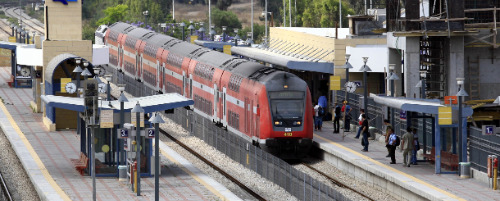High-tech sensing data from satellites, airplanes, and unmanned aircraft come together in an early-warning system for train operators that can predict natural disasters and prevent terrorist attacks.

A new early-warning hazard system for railways should both facilitate the prediction of natural disasters and help to prevent terrorist attacks.
An Israeli professor is working with a European consortium of researchers to collect high-tech sensing data from satellites, airplanes, magnetic and soil sensors, and unmanned aircraft to devise a solution that will provide a reliable early-warning system for train operators. The new system should secure the safety and reliability of essential transportation networks.
Thousands of people around the world have died in train wrecks caused by natural disasters. In 2004, the tsunami in Southeast Asia derailed a Sri Lankan train, killing 1,700 people. But with modern advances, these tragedies can be avoided and Prof. Lev V. Eppelbaum of Tel Aviv University’s Department of Geophysics & Planetary Sciences, working in collaboration with teams from seven countries, is leading the way.
A system to detect disaster
It’s all part of the European Project FP7 research, “Integrated System for Transport Infrastructures Surveillance and Monitoring by Electromagnetic Sensing,” which includes participants from Israel, Italy, France, Sweden, Norway, Switzerland and Romania. The international team of researchers aims to connect emerging technologies so that train accidents caused by avalanches, earthquakes, and even terrorists can be avoided.
“Sinkholes, avalanches, landslides, earthquakes, flash floods – these disasters can cause train wrecks anywhere around the world,” says Eppelbaum. “We are hoping to develop a platform that can be fitted to any railway, passenger or freight carrier, to better predict natural disasters and possible terror attacks on rail lines.” He says that his part of the study should be completed by next year.
“We are creating a new interpretation system, allowing us to integrate cutting-edge technologies from across Europe,” he relates, adding that the current biggest challenge is eliminating background ‘noise’ from the data being collected.
Climatic features and parameters such as soil types and physical geography can be very different from one region to another, which makes the work even more of a challenge. Some of Eppelbaum’s recent research advances have been reported in the Zeitschrift für Geomorphologie, the Journal of Arid Environments and the Proceedings of the SAGEEP Conference (USA).
More Americans will be riding the trains
The international team also hopes to examine the risk of terrorist attacks on trains. While all the other data collected by the research teams will be made public, this section will remain top secret.
Eppelbaum expects that the teams’ methods will be adopted by the world’s railway systems. As the cost of fuel for cars and planes rises, and environmentally friendly train travel is more heavily promoted, experts predict that more Americans will be riding the rails to work and between cities. In 2008, about 30 million passengers rode on Amtrak trains, and figures have been steadily increasing.
At present, there is no monitoring system for either natural disasters or terrorist attacks on rail systems in America or anywhere else, so that Eppelbaum says he has his work cut out for him.
His challenge is to bring together different geophysical measurements and formats for sensors. His work involves the collection of very different types of data and their transformation into practical information. “It’s complicated math and physics,” concludes the professor.












